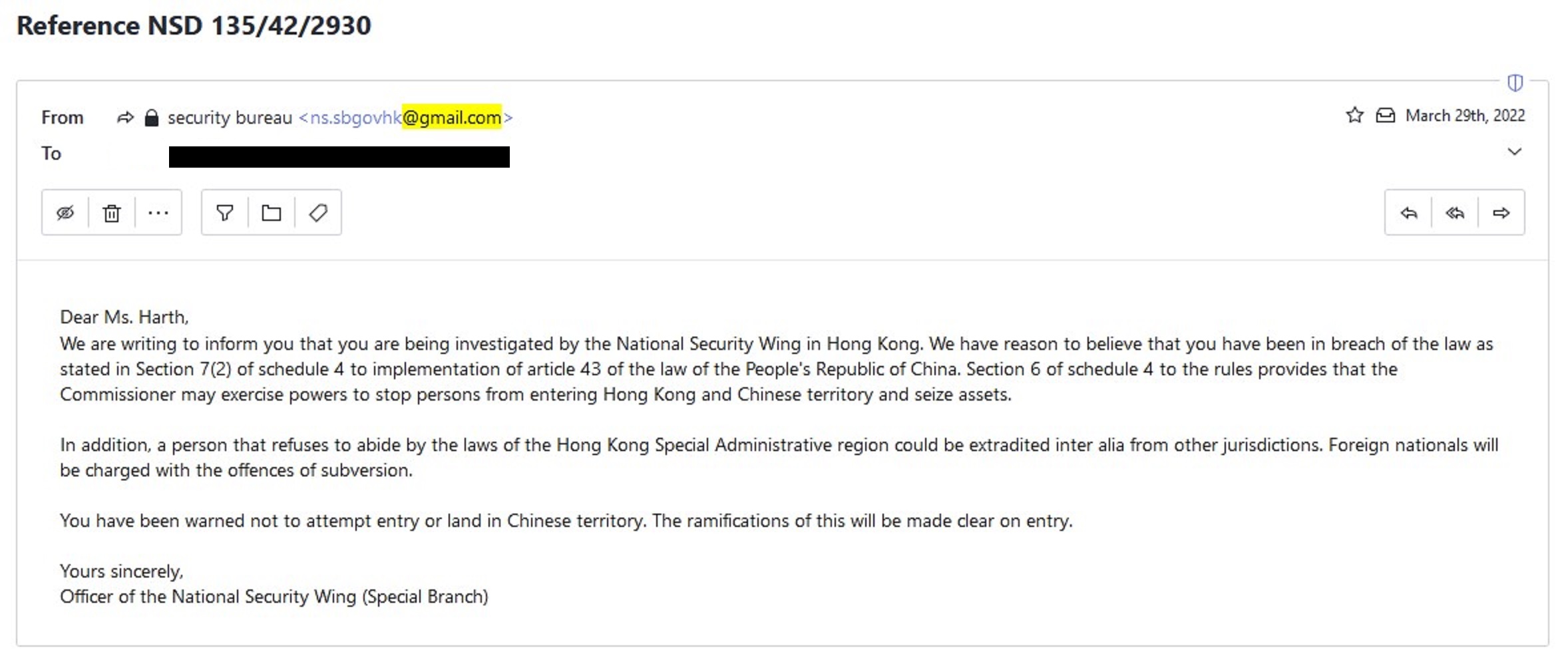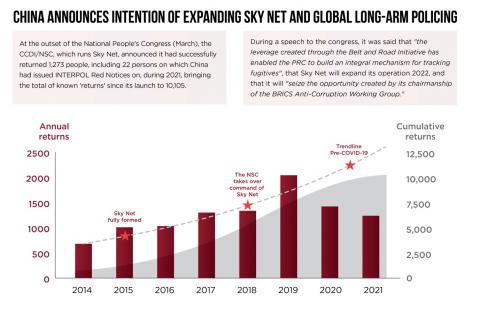HKPF closes investigation of fake threats against Safeguard Defenders staff
Updates:
On March 29th, our Campaign Director Laura Harth received a meager attempt at intimidation by someone posing as an officer of Hong Kong’s “National Security Wing (Special Branch)”. The outline and timing of the email closely follow the real suit brought against Hong Kong Watch and its CEO Benedict Rogers earlier in March 2022, with the addition of making express reference to the possibility of extradition from other jurisdictions over breaches of Hong Kong’s laws.
> Later, on April 8th, the same email address was used to attempt to contact Laura Harth again, but no longer pretending to be part of the HKPF.
> Today, August 10th, some four months after a formal complaint was filed, The Cyber Security and Technology Crime Bureau of the Hong Kong Police Force (HKPF) responded to the official complaint filed by Safeguard Defenders, claiming "insufficient evidence to support a charge against any person," that there will thus be no prosecution, and the case has been closed. Since this meager intimidation attempt, there has been a flurry of similar fake emails circulating, targeting critics but seemingly focused on those critical of the CCP and/or PRC, and none - of which Safeguard Defenders is aware of - pretending to be part of the HKPF. Safeguard Defenders provided the full header data of the email to the HKPF to help them in their investigation, to, seemingly, no avail.
Prior article/details:

The letter appears to come as a direct reference to what has become one of Safeguard Defenders’ key campaigns: halting extraditions to mainland China and Hong Kong, while exposing the CCP’s increasingly brazen long-arm policing operations across the globe. Ironically, the emailed threat arrived as SD's Director Peter Dahlin had just arrived in Cyprus to appear in a court hearing, presenting information on these types of activities, and on the Chinese criminal justice system, in order to stop Cyprus' first-ever extradition to China, with new developments of Chinese misuse of INTERPOL and transnational repression in Cyprus recently published by Safeguard Defenders.
These operations, part of Xi Jinping’s signature “anti-corruption” campaign and more often than not used against dissidents, human rights defenders, or ethnic and religious minorities, have the bespoke dual aim of ensuring the involuntary return of so-called “fugitives” and of instilling sufficient fear into these communities as to effectively silence them and stifle dissent against the Chinese Communist Party and its leadership.
As exposed in our report Involuntary Returns, an official legal interpretation of China’s National Supervision Law by the Central Commission for Disciplinary Inspection (a CCP body) to the National Commission of Supervision (its State front in charge of global policing operation Sky Net) expressly provides for the use of any means necessary to achieve these goals: from threats and harassment against family and loved ones back home, to sending agents abroad to threaten and harass individuals into compliance and “voluntary return”, to entrapping and luring individuals to third countries from where their return may be more easily secured through extradition or deportation, to – last but not least, and happening also in democratic countries – outright kidnappings.
Bilateral extradition treaties as well as police cooperation agreements, in particular with the National Commission of Supervision as is the case of the Australian Federal Police and – low and behold – the UNODC, play a crucial role in this transnational repression effort and put lethal strain on the upholding of the international legal obligation of non-refoulement, fundamental freedoms and territorial sovereignty.

Under the UN Convention Against Torture and the UN Convention for the Protection of Refugees, countries have a solemn obligation to not return individuals to countries where they may be at risk of torture. Since Xi Jinping’s ascension, mainland China - and Hong Kong since the imposition of the National Security Law – have seen an exponential deterioration of minimal judicial and policing safeguards. Enforced disappearances and torture are rife.
One of its main authors is the very same National Commission of Supervision in charge of operation Sky Net and responsible for the disappearance of tens of thousands into the incommunicado detention system Liuzhi since its inception in 2018. Another one is the Ministry of Public Security, in charge of directing international operation Fox Hunt while responsible for the disappearance of tens of thousands – among whom many human rights defenders, human rights lawyers, activists, feminists, labor rights advocates, journalists and foreign nationals – into China’s black jails of Residential Surveillance at a Designated Location (RSDL) and for the mass internment campaigns underway in the Xinjiang Uyghur Autonomous Region.
Fair trials and respect for international treaties or consular agreements are an illusion within the People’s Republic of the Disappeared, effectively rendering any and all extraditions to China impossible if one were to abide by its international obligations.
So why would eleven European Union Member States, bound to uphold the highest standards of fundamental freedoms and human rights by its founding Treaties and to promote and defend them in all relations with third countries, maintain active extradition treaties with mainland China or Hong Kong?

Following Beijing’s imposition of the National Security Law on Hong Kong, the European Council unanimously recommended the suspension or non-ratification of all bilateral extradition treaties with the Special Administrative Region. Almost all complied, except the Czech Republic and Portugal. Earlier this year, we reported on the growing threats by both the Hong Kong police force (HKPF) and government officials on chasing down exiled ex-lawmakers and democracy protesters by any means necessary, including multiple threats of using INTERPOL to capture and return them.
Despite reiterated and clear-cut calls by the European Parliament throughout 2021 and 2022 to suspend ALL bilateral extradition treaties with both mainland China and Hong Kong, at present nor the European Commission nor the European Council seem intent to heed these calls.
This represents a massive failure to adequately understand and address the extent of the threat the very existence of these treaties poses to the safety and fundamental freedoms of its citizens and all those residing on its territories.
In adopting the line that sufficient judicial safeguards will protect individuals to an enough extent to not actually extradite someone, they demonstrate both a fundamental lack of understanding of the how and why of transnational repression as a key tool for the CCP to crack down on dissent anywhere around the world, and ignore the enormous costs imposed on individuals targeted by such measures.
In Cyprus, a Falun Gong practitioner who left China was targeted by the Chinese authorities for extradition in 2020. While appealing the extradition request, his spouse was directly threatened by Chinese police and embassy personnel in front of the local Cypriot courthouse. The imparted message was clear: each testimony that might damages the image of ‘the Party’ would lead to the arrest of one of their family members in China. As her husband refused to give in to such threats and continues fighting his extradition, they followed up on their promise by detaining three family members since this January, including his father. A separate story on this case is soon to be released.
In Poland, Yu Hao, a Chinese man who took his own life in 2020 after spending some two years waiting for his extradition hearing in Warsaw’s detention centre, was yet another victim of Chinese police operations abroad. China managed to entrap him in Poland through an INTERPOL Red Notice. His spouse, after being subjected to similar methods of intimidation and threats by Chinese police, chose to return to China ‘voluntarily’.
These are but a few of continuously ongoing examples around the world. Scare tactics are an integral part of a broad strategy to silence dissent and stifle an individual’s defence from extradition or deportation. The Chinese Communist Party will stop at nothing to obtain the return of those it seeks. As Foreign Ministry spokesperson Zhao Lijan put it in response to our report Involuntary Returns on January 19, 2022: “The Chinese government will […] bring them to justice even if they have fled to the ends of the earth.”
Time and time again, activists and Members of Parliament – some of whom have been equally warned from traveling to countries with active extradition treaties with China – have appealed European authorities to take stock of these operations and take adequate measures to protect them. They have been ignored in what represents a blatant failure of Governments’ obligation to protect the safety and rights of those residing on its territory.
 While on March 21st, following the U.S. Justice Department’s charges for brazen and wide-ranging schemes to stalk and harass Chinese dissidents against 5 men accused of acting on behalf of the Chinese Government, the U.S. State Department announced visa restrictions on those responsible or complicit in such acts of transnational repression, China has announced it will expand its Sky Net operations in 2022 and will leverage the Belt and Road Initiative to do so.
While on March 21st, following the U.S. Justice Department’s charges for brazen and wide-ranging schemes to stalk and harass Chinese dissidents against 5 men accused of acting on behalf of the Chinese Government, the U.S. State Department announced visa restrictions on those responsible or complicit in such acts of transnational repression, China has announced it will expand its Sky Net operations in 2022 and will leverage the Belt and Road Initiative to do so.

The European Union has a fundamental choice to make: stand up for its values and protect the freedoms of thousands living in a daily fear brought on by an incessant slew of harassment and threats – including the use of extraditions – or forego its sovereign obligation to do so and actively legitimize the undermining of the international rules-based order by a regime intent on spreading its reign of political terror across the globe.
*** The email received on March 29th was denounced to Italian and Hong Kong police authorities.